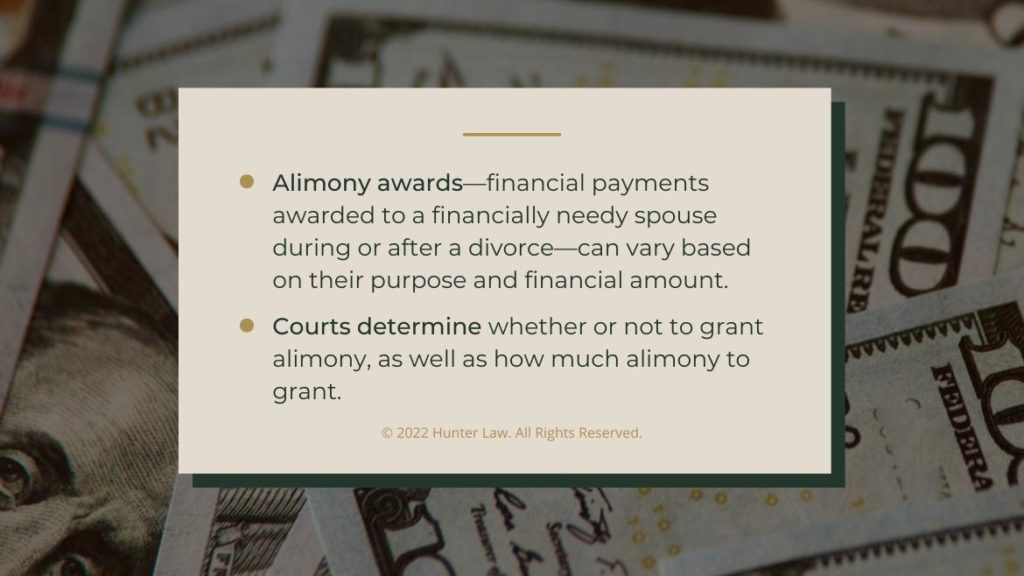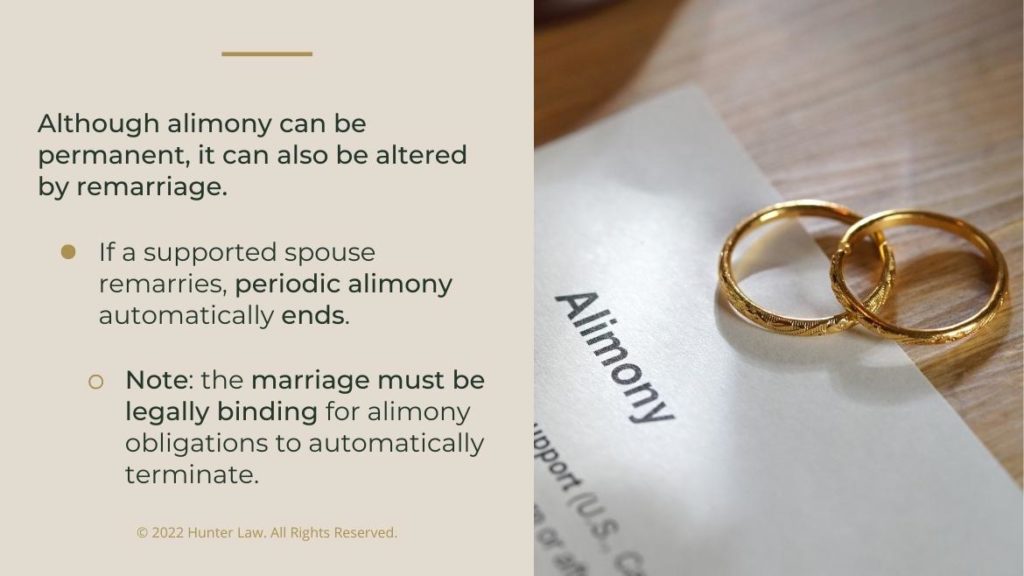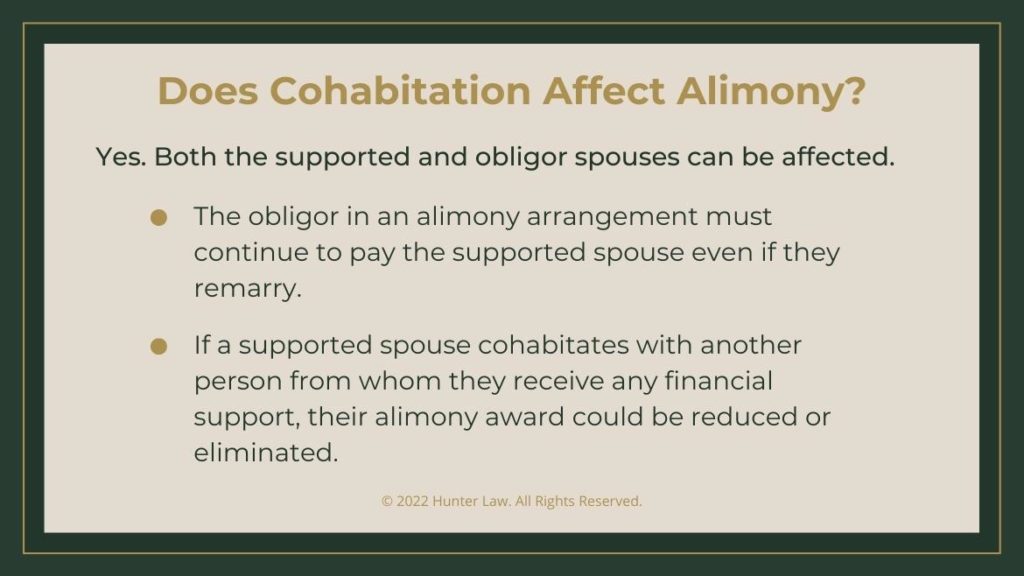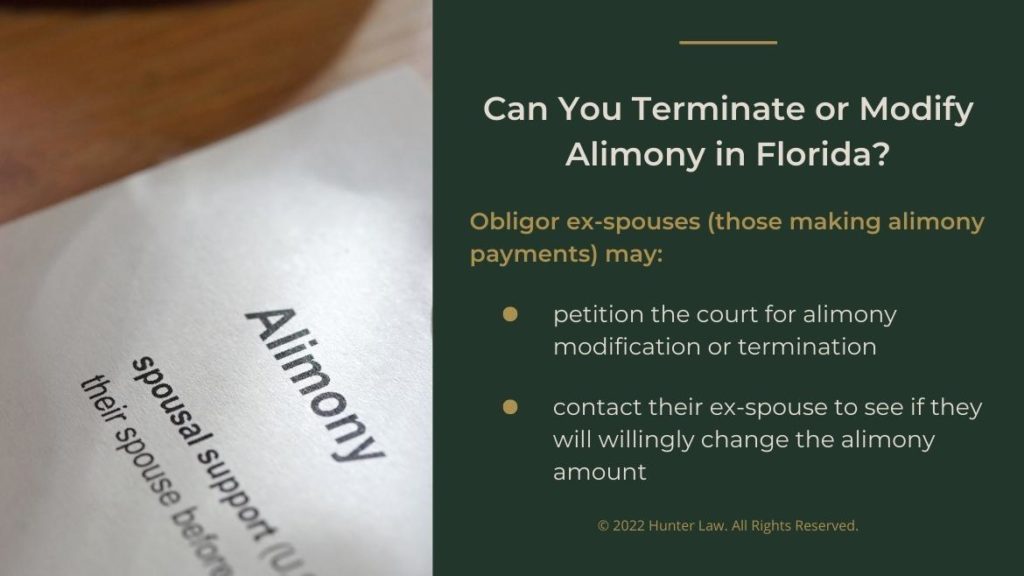Getting divorced doesn’t necessarily mean the end of financial obligations between both parties. In many divorce cases, the court could award alimony to a financially needy spouse. That alimony must be paid by the financially able partner in the former couple. However, alimony is not always a permanent arrangement. Cohabitation or other developments may lead to the reduction or elimination of alimony based on surrounding circumstances. This article will break down how alimony laws work in Florida. It will also explain how remarriage, cohabitation, and other developments can affect alimony payments.
Alimony Laws in Florida
Alimony is a financial payment awarded to a financially needy spouse during or after a divorce. Alimony awards can vary based on their purpose and financial amount.
For instance, some Florida courts may award temporary alimony to support a financially needy spouse while the divorce case is ongoing. Or, a Florida court may award an alimony payment to a spouse to help them achieve a degree or certificate to help them become less financially dependent on the paying spouse or help them transition to being single. In other cases, a Florida court may award alimony over a longer duration to allow a needy spouse to maintain the same standard of living they had during the marriage.

Most Florida divorce cases involve recurring alimony payments, where regular payments are made according to a monthly (or other) schedule. Courts determine whether or not to grant alimony, as well as how much alimony to grant, based on factors like:
- How long was the marriage
- The standard of living of both partners during the marriage
- The health and age of each spouse
- The financial resources of each spouse, including any property divided or awarded during the divorce
- The earnings, earning potential, and sources of income of each spouse
- The contributions of each spouse during the marriage
- The childcare responsibilities of each spouse during the marriage
- The tax and locations of alimony awards
- And more
How Does Remarriage Affect Alimony in Florida?
Alimony can be altered by remarriage. If a supported spouse remarries, periodic alimony automatically ends. Most other forms of alimony also end on the date of the legal marriage.
However, note that the marriage must be legally binding for alimony obligations to automatically terminate. Furthermore, alimony can impact each spouse in an alimony arrangement differently.
Read more in our blog: What Is the Difference Between Spousal Support and Alimony in Florida?
The Receiving Party
The receiving party stops receiving alimony payments from a supporting spouse or obligor if they legally remarry in Florida or any other state. Alimony payments terminate on the date of the marriage.
However, a receiving party or ex-spouse may still receive a property transfer or lump-sum alimony payment even if they remarry.
The Obligor
The obligor in an alimony arrangement does not have their alimony responsibilities waived if they remarry. For example, if an ex-husband in a former marriage remarries and takes a new wife, they must still make alimony payments to their ex-wife for the duration of their court order.
Does Cohabitation Affect Alimony?
Yes. cohabitation can affect alimony for both the supported and obligor spouses.
If a supported spouse starts cohabitating with another person, they could have their alimony award reduced or eliminated. Under Florida law, “cohabitation” counts as:
- A living arrangement where a supported spouse lives with another person they aren’t related to by blood or marriage AND
- A living arrangement where the supported spouse receives financial assistance from the other person
For example, if a supported ex-spouse in an alimony arrangement moves in with a new long-term partner, and that partner provides any form of financial support, the obligor spouse may have grounds to petition the court for an alimony reduction.
How Is Cohabitation Determined?
If the court receives an alimony modification or termination petition, it will determine cohabitation on the part of the supported spouse by looking at factors such as:
- Whether the supported spouse claims to be married in public
- Whether the supported spouse uses the same last name as their new partner
- How long the supported spouse has lived with their new partner
- Whether the supported spouse receives any financial assistance from their new partner
- Whether the supported spouse and the new cohabitant work together or if one party works for the other
- Whether the supported spouse and the new cohabitant have purchased property to be used together
- Any further factors that may indicate a financial relationship between the supported spouse and the new cohabitant
Can You Terminate or Modify Alimony in Florida?
Obligor ex-spouses (those who make alimony payments to a supported spouse) may petition the court for alimony modification or termination. Alternatively, they can contact their ex-spouses to see if they will willingly change the alimony amount.
Generally, this is appropriate if:
- The obligor spouse suspects that their former partner is cohabitating with another person and receiving financial support
- The obligor spouse believes their former partner now makes sufficient money to warrant a reduction or elimination of their alimony payments
If the supported spouse does not agree to alimony modification or termination, the obligor spouse can file a written request to the court. They can formally ask for termination or modification to their alimony arrangement.
To succeed, the obligor ex-spouse must provide evidence to show a change in the supported spouse’s financial situation or prove that they are cohabitating with a financially supportive partner.
This can be difficult on your own, but knowledgeable family law attorneys may be able to help by gathering evidence for you, presenting it persuasively in court, and more.
Contact Tampa Family Law Attorneys Today
It can be difficult to get the court to reduce or eliminate alimony payments if your ex-spouse is cohabitating with another person. Alternatively, you may feel that your alimony arrangement was unfair or needs to be modified for another reason.
Regardless, you should contact knowledgeable Tampa family law attorneys right away. With legal professionals on your side, you’ll have a greater chance of seeing a favorable outcome and avoiding unnecessary alimony payments. Contact Hunter Law today.





